syria
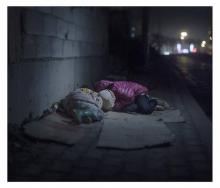
All of us are understandably sad about Paris — devastated. Many people have used striped profile pictures, candles, and flowers to express our collective solidarity. But in the wake of tragedy, almost half of the governors of the U.S. have responded with fear, announcing that they will do whatever they can to thwart the acceptance of Syrian refugees — from cutting funding for nonprofit resettlement agencies, to demanding religious screening tests.
If there’s one thing I learned from some of my friends who are refugees, it’s how to respond to grief. And there’s no one approach and they didn’t always get it right. But sometimes they did: Some refugees, in the shadow of shocking sadness, sang more than usual, prayed louder, invited more friends over for dinner, cooked their parent’s recipes. None of them responded with terrorism.
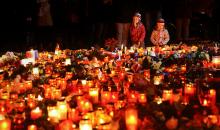
From a religious perspective, the hardest thing about confronting evil is the painful human tendency to only see it in others, in our enemies, and not see any on our side because of the blurred vision caused by the specks in our own eyes, to paraphrase the gospels. In discussing ISIS, we should clearly use the language of sin — the enormous sin of the ideological hate of ISIS finding its victims all over the world.
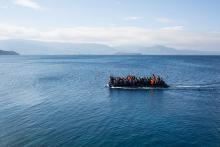
French president François Hollande announced on Nov. 18 that France will continue to resettle refugees.
Over the next two years, Hollande said that France would welcome 30,000 refugees from Syria and Afghanistan, among others. This is even more than his September commitment of 24,000.
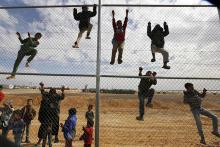
Evangelicals may be united that the Bible is the ultimate source of authority, but they are divided on how the Bible would lead us to respond to the growing crisis of refugees fleeing from Syria.
What is the best way to show Christian love and compassion? How is the church’s role different from the state’s? How do we show wisdom and prudence in securing the safety of our neighbors and nation?
These are just a few of the questions that evangelicals are grappling with. One evangelical pastor today told me, “My church members are all over the place on this!”

World Relief, which calls itself the "biggest evangelical refugee resettlement agency in America" is urging political leaders around the country -- many of whom consistently court evangelical votes -- to support the resettling of Syrian refugees in this country. Politico.com quotes World Relief's vice president Jenny Yang who says that talk of shutting such refugees out "does not reflect what we've been hearing from our constituencies, which are evangelical churches across the country."
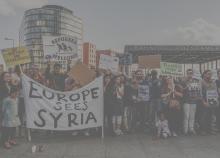
Christian groups are strongly condemning the anti-refugee rhetoric coming from top GOP leadership this week, reports POLITICO.
In the wake of the Paris attacks, many in the U.S. media speculated that one or more of the attackers had entered France as refugees from Syria, prompting state senators, governors, and even U.S. presidential candidates for the GOP to vow to close U.S. borders to Syrian refugees altogether.
These statements are being decried by Christians nationwide, including those with more historically conservative positions on immigration and foreign policy.
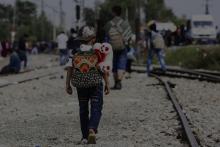
As we stand together around the world, shocked and mourning with the thousands who lost their fathers, mothers, sisters, brothers, relatives, and friends in France, Lebanon, and Iraq, one thing bothers me most about the narrative around the terrorist attacks in Paris.
From the moment first reports started streaming in from France, even when the details surrounding the tragedy were very scarce, mainstream media pundits were far too eager to bring Syrian refugees into the story of the Paris massacre. They planted the seeds of doubt into the minds of millions that somehow Syrian refugees shared responsibility for the massacre.
Two months ago I worked on the last several miles of the refugee trail from Syria, Iraq, and Afghanistan to the Croatian border. I helped drive nearly 100 refugees to the border, and distributed food, water, clothes, and shoes to at least 2,000 more.
I still remember the stories of some who did not hesitate to tell my team why they left Syria or Iraq.
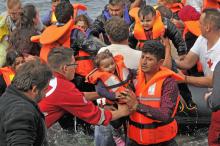
Whether you like it or not, Christians are called to help the world’s most abused, hurt, helpless, exploited, and destitute.
If you’re a follower of Christ passionate about social justice, of if you attend a church that claims to be enthusiastic about global missions, or if you’re part of a Christian organization that facilitates ministry, you’ve been handed a golden opportunity — the ability to minister to millions of people in desperate need.
This is a chance to be radically countercultural — to glorify Christ through selfless sacrifice, hospitality, and love. Being a Christ-follower isn’t easy, and it will require hard work, but it’s worth it.

President Obama has decided to deploy a small number of American Special Operations forces to Syria, according to the New York Times.
CNN reports a senior administration official said the forces will be "fewer than 50."
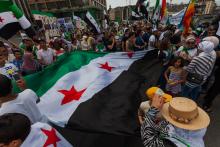
THE MOST CRITICAL priority for the international community regarding Syria—in addition to addressing the immediate humanitarian needs—is to implement a cease-fire in as much of the country as possible. An arms moratorium on both the regime and rebel groups must be implemented and strictly enforced. And negotiations for a more democratic and representative government should move forward, even if it initially includes important foreign and domestic elements who do not share those values.
Especially in response to Russian military actions in Syria, President Obama is being pressured by both Republicans and Democratic hawks to militarize the situation further by sending more arms to rebel groups and increasing direct U.S. military involvement. As problematic as such military responses may be, the diplomatic alternatives aren’t much better.
Some of the most powerful opposition forces—the so-called Islamic State (ISIS) and other hardline Islamists in the al- Nusra Front—appear to have little interest in negotiations. And the prospect of working out an arrangement that would keep in power Assad’s brutal regime, which has been responsible for the vast majority of the more than 100,000 civilian deaths in the nearly five-year conflict, is extremely hard to accept.
Unfortunately, unlike most dictatorships that have been overthrown by armed or unarmed struggle in recent decades, the power in Damascus does not rest in the hands of a single dictator. Assad heads a longstanding ruling apparatus led by the Baath Party and the military that, despite its corruption and brutality, still has a social base. A fairly large minority of Syrians—consisting of Alawites, Christians and other minority communities; Baath Party loyalists and government employees; the professional armed forces and security services; and the largely Sunni crony capitalist class that the regime has nurtured—still cling to Assad’s government.
They constitute a large enough segment of Syrian society so that no anti-regime struggle can win without cascading defections, which is unlikely when the alternative is perceived to be rule by totalitarian Salafists such as ISIS.
During the first six months of the uprising in 2011, when the anti-regime movement was largely nonviolent, pro-democratic, and more diverse in terms of support, it appeared the regime could be eventually toppled. Now, in the context of armed struggle and the rise of Islamist extremists, many who once were working to topple the regime see it as the lesser evil.

“U.S. military intervention is the problem, not the solution. Since the U.S. started bombing Iraq and Syria last year, ISIS has grown stronger.”
In the months since Cortright’s charge the world has witnessed millions of Syrian citizens fleeing the conflict. Having saturated the capacity of neighboring nations to accept refugees, displaced Syrians have continued north through Turkey and Eastern Europe, en route to Germany and neighboring countries. In September, Russia inserted itself into the Syrian military calculus, offering military support for, it claimed, the Assad regime’s fight against ISIS. Instead Russian bombs showered insurgent Syrian rebel forces. Recent reports confirm that Russia is actually helping Assad retake Aleppo, the largest city in Syria, from insurgent forces, with an Iranian assist.
In moments like these it is tempting to stand in solidarity with the disciple Peter, who tried to defend the helpless with military might. When Jesus was seized by temple police, Peter took out his blade and sliced off the ear of the high priest’s servant, Malchus. (Matt. 26:51-56, Luke 22:50, John 18:10-11). Jesus stopped him.

Three years ago, I was a U.S. State Department officer deployed to Turkey to work with the Syrian opposition. It was an amazing opportunity to support Syrian activists and civic leaders waging an improbable — yet remarkable — popular struggle, against a criminal regime that responded to peaceful protests with bullets and torture. For [the previous] eight months since the start of the revolution in March 2011, Syrian activists — Sunni, Christian, Kurdish, Druze, and Alawite — had used demonstrations, sit-ins, resistance music, colorful graffiti, online satire, and dozens of other nonviolent tactics to challenge the Assad regime. My task, along with that of my U.S. government and international colleagues, was to aid their efforts.
A year earlier, I co-wrote and published a book with Erica Chenoweth, called Why Civil Resistance Works: The Strategic Logic of Nonviolent Conflict. In it, we tested the conventional wisdom that only violence works against formidable foes like dictatorships and foreign military occupations. In studying 323 violent and nonviolent campaigns from 1900-2006, Erica and I found that nonviolent civil resistance was twice as successful as armed struggle — even against militarily superior opponents willing to use violence. We also found that nonviolent struggle helps consolidate democracy and civil peace.

The great Old Testament scholar Walter Brueggemann once observed that when you look at the Hebrew prophets, you find almost all of them were poets. Not just preachers, but poets … poets who wrote with a prophetic imagination.
Poets don’t just say more words.
They imagine the world differently.
They imagine possibilities beyond others’ imagination.
They create a new way of seeing things.
They call a new creation into being.
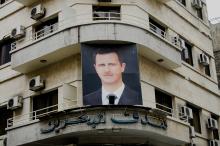
The Syrian crisis is escalating in unnerving ways with the arrival of Russian troops and the beginning of direct Russian military intervention. What had been a local and regional humanitarian disaster now risks becoming a superpower confrontation between Russia and the United States. Undoubtedly the introduction of Russian firepower on the scene will bring more civilian suffering, dislocation, and death.
If I were looking for handles for prophetic preaching on the Syria situation, I might select the following.

“IF THERE IS A SHELLING, stay away from the windows and crouch next to a sturdy piece of furniture—like a bed or a wardrobe.”
“In the case of a bombing, cover your head with your hands and scream for help.”
Although they read like lines from an emergency-preparedness instruction manual, these are actually from a children’s coloring book. The book follows Mahr, a little boy with big brown eyes and a bowl-shaped haircut, and “Bebo, the Puppy”—a slightly obese, striped orange dog—through a series of emergency situations, the kind that have been all too common in Syria.
“Just fold your hands over your head, like Mahr and Bebo, the Puppy.”
The book is illustrated, written, and distributed by Syria Civil Defense—a group of 2,600 volunteer rescue workers, renowned for saving civilians from explosions and barrel bombings in opposition-controlled Syria. The book is intended to instruct children, in a playful yet serious way, how to act during barrel bombings and shellings, which have become a part of daily life in Syria.
Mahr crouches next to a wardrobe during a shelling. After a barrel bombing, Bebo folds his paws over his floppy, cartoonish ears and screams for help. The wardrobe—another character in this Brave Little Toaster-like adaptation of a child’s perspective of the Syrian civil war—smiles down at both of them.
“Don’t worry—the civil defense is on its way.”
Although the Syrian revolution began as a nonviolent movement, inspired by the Arab uprisings in 2011, the Assad regime’s brutal and almost immediate crackdown on the demonstrations quickly escalated the protests into an armed revolt and, eventually, a civil war. Some protesters began to take up arms in self-defense, joined by defectors from the regime’s army, and later foreign fighters—forming what would become known as the Free Syrian Army (FSA), engaging in guerrilla-style military tactics to challenge the Assad regime.

As the the refugee crisis worsens, President Obama has directed his administration to resettle at least 10,000 Syrians over the course of the year, reports The New York Times.
Pressure on the U.S. has been mounting from European nations to increase its promised quota of 2,000. White House press secretary Josh Earnest made the announcement Sept. 10.
According to The New York Times,
The announcement brought a variety of reactions that underscored how the refugee crisis has become another polarized political question. Aid groups called the administration’s action a token one given the size of the American economy and population, while a number of Republicans warned that Mr. Obama was allowing in potential terrorists. “Our enemy now is Islamic terrorism, and these people are coming from a country filled with Islamic terrorists,” said Representative Peter T. King, Republican of New York. “We don’t want another Boston Marathon bombing situation.”

The pope’s teachings and his deeds have inspired people to put aside their differences and to work together for a common good. We hope that this momentum will carry over to the debates on immigration. We must work together push back against the hateful anti-immigrant messaging coming from some of our elected officials and candidates for office, and draw on the moral high ground we find in our faith and Scriptures. Including Matthew 25.
Beyond the need for broad-based legislative reform, ordinary people and communities of faith in the United States can also make a difference on an individual and family level. Just as the pope has called on European Catholic churches to “welcome the stranger” in their own parishes and homes, American churches, synagogues, mosques, and even individual homes should take up that challenge as well. It’s time for people in the United States and Europe to learn what it really means to welcome the stranger.

July is the cruelest month, with apologies to T.S. Eliot. ...
A movement has arisen in the past year to protest police brutality and the unjust killing of African Americans — an uncomfortable realization that the dream of civil rights has gone unrealized in a still-racist America. It's called Black Lives Matter, but in the summer of 2015, life seems cheap.

National Minority Mental Health Awareness month is upon us in the U.S., and never has the scope and impact of mental health issues threatened to affect the long-term security of our country and world than now.
This year, the UN Office for the Coordination of Humanitarian Affairs estimates that 10.8 million people are affected by the conflict in Syria, with 4 million refugees having fled the country. This is the largest refugee population coming out of any one conflict in over a generation. Similarly, in early 2015, UNHCR estimated that the total population of concern, due to the conflict in Iraq, exceeded 3 million people. Millions of people have experienced the unimaginable trauma of political and religious conflict and persecution in the Middle East, especially women, whom the Iraqi Ministry of Health determined were disproportionately affected by mental health illness due to the recent conflict. The scale and depth of the trauma demands a multi-faith, multi-sector, multi-discipline response, before it is too late.

The Vatican has released a new Arabic-language guidebook, the first of its kind, which aims to bring the culture of the Catholic Church to a new audience.
Titled The Vatican, its Significance and its Monuments, the guidebook hit bookstores around the Holy See late last month and goes beyond sightseeing tips.
The book’s author, Edmond Farhat, said he was compelled to write the guide after a lengthy diplomatic career representing the Vatican across North Africa.